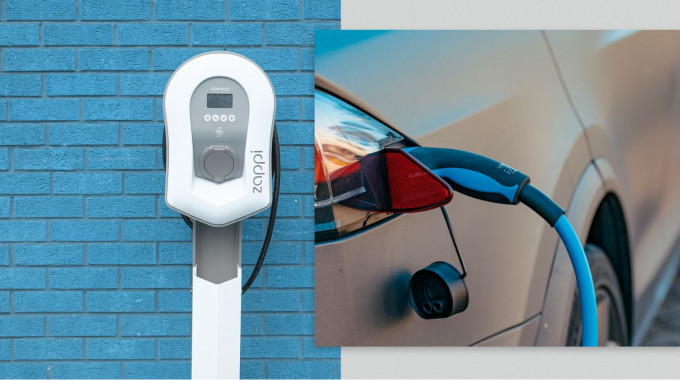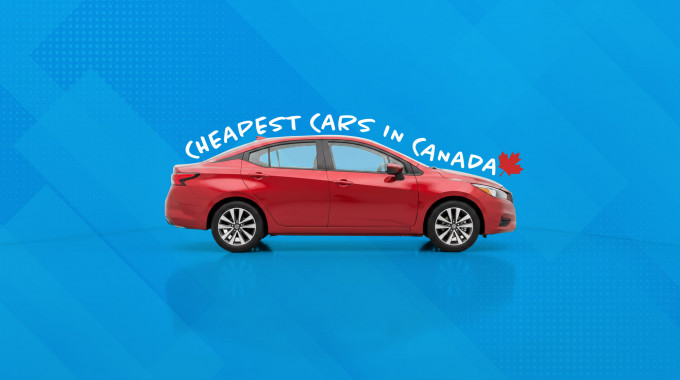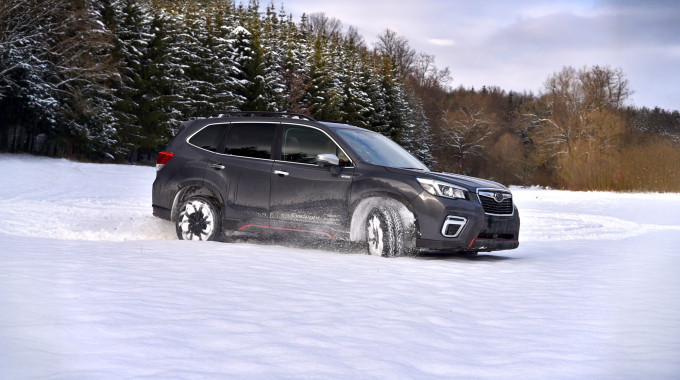
How Long Does It Take To Charge an Electric Car & How Much Does It Cost?
In the next two years, dozens of new electric vehicles will be entering the Canadian market. Consumers have spoken and the green technology is clearly here to stay.
But while EV adoption continues to uptick, there are still a lot of common unknowns when it comes to charging electric vehicles – where to do it, how much it costs, and how far you can get on a single charge, just to name a few. We’re going to plug you in with answers to all these common questions about charging electric vehicles.
Read more: Going Electric: Should I Buy an EV in 2022?
What are the different types of EV chargers?
Whether you’re charging at home in your garage or at a public station, you are going to experience different levels of speed and voltage power. A standard home outlet is likely going to be your slowest option, but it will also be the most convenient. Public charging stations can vary in speed and adaptability. Here’s a look at the various types of EV chargers:
Level 1 & 2 charging
Most home and public charging stations across Canada use Level 1 and Level 2 charging, with the J1772 protocol outlet, that works for all makes and models. Level 1 uses a 120-volt connection, while Level 2 delivers twice the power at 240 volts and a big increase in charging speed. Both are good if you can plug in for multiple hours or need a slight top-up at a public station to get home to an overnight charge.
Level 3 charging
There’s also a combination of the two that uses both the Level 1 and Level 2 charging ports with one adapter (called CCS Combo) for fast-charging capabilities. Known as DC Fast Charging, or Level 3 charging, this is your fastest option at 480 volts. Almost all electric cars can use it since it’s a standard supported by most carmakers. Tesla now offers an adapter for owners to use CCS networks too.
Tesla Superchargers
The Tesla Supercharger network is a different beast. These are proprietary Tesla charging devices that can add up to 320kms of range in just 15 minutes. The Supercharger network is exclusive to Tesla owners – at least, for now – and the network stretches from coast to coast in Canada. Many early adopters received free Supercharger access, but that program has been retired for recent purchasers.
Online app resources like ChargePoint and ChargeHub offer maps for finding public charging stations across North America at all voltage levels, including Tesla Supercharger stations.
Read more: Charging a Tesla: How Much Will It Cost & How Long Will It Take?
How does home charging work for electric vehicles?
All chargers designed for residential installations are either Level 1 or Level 2. Most cars have Level 1 chargers integrated into the vehicle with just an electrical cord to connect and plug into a traditional socket. On average, it adds around 200kms of charge per 20 hours plugged in. In other words, keep your calendar free if you want a full charge.
Level 2 home chargers are separate units. They use 240-volt outlets – the same amount of power used by your home appliances like a stove or dryer – but they charge a lot faster than Level 1 (anywhere from three to seven times faster). The typical price for charging those units range between $700 to $1,000 and require a professional electrician to install it, so accounts for around $1,000 more for the labour and supplies. Tesla has a Level 2 Wall Connector that costs $635.
What does it cost to charge an electric car?
Currently, charging rates follow your province’s electricity rates although provinces like BC are considering adopting EV charging rates for home users. That could increase the price to charge your EV, but it will still be considerably less than filling up with gas.
It costs Tesla drivers who use the Supercharger stations approximately 40% of what the same range would cost on a gas-powered car. As for charging rates at public stations, it’s up to the station owner to set their rates. Petro-Canada, for example, charges $0.27 per minute with their EV fast-charge network in BC, though many public charging stations in cities offer to charge at no cost to incentivize EV adoption. Pricing details are listed on ChargePoint’s online maps for each station.
The CAA website has a great driving costs calculator that can help you understand what your yearly charging costs will look like depending on your province or territory. Based off these CAA calculations (and not including initial home charger installation costs), a:
- 2021 Tesla Model 3 (Long Range) sedan owner in Ontario can expect to pay about $375* in fuel costs per year.
- 2021 Nissan Leaf Plus SV 5D hatchback owner in British Columbia can expect to pay about $550* in fuel costs per year.
- 2021 Chevrolet Bolt LT 5D hatchback owner in Alberta can expect to pay about $535* in fuel costs per year.
*Based on 45% highway, 55% city driving and 20,000 annual kilometres (November 2021).
What electric vehicles are available in Canada?
These are almost all of the electric vehicles available in Canada in 2021. You'll find a description of each vehicle, its range, and how long it takes to charge.
- Hyundai IONIQ Electric
- Hyundai Kona Electric
- Chevrolet Bolt EV
- Chevrolet Bolt EUV
- Tesla Model 3
- Tesla Model S
- Tesla Model Y
- Tesla Model X
- Audi e-Tron
- Kia Niro EV
- Kia Soul EV
- Ford Mustang Mach-E
- Nissan LEAF
- Volvo XC40 Recharge
- Jaguar I-PACE
- Porsche Taycan
- BMW i3
- MINI Cooper SE all-electric
Hyundai IONIQ Electric
The Hyundai IONIQ is one of the earlier entrants in the EV race. It’s a stylish sedan that combines a sporty look with economic performance. With a 100kW electric motor and a 38.3kWh battery, it offers plenty of range for any city driver, although the charging rate leaves room for improvement in future generations.
MSRP: $41,599
Range (on a full charge): 274km
IONIQ Electric charging time
- Level 1: 35.5 hours
- Level 2: 6 hours
- Level 3: 54 minutes to 80%
Hyundai Kona Electric
Compact SUVs are incredibly popular, and the Kona Electric offers the utility and functionality shoppers want with the fuel savings that EV buyers demand. At 415km, the Kona EV’s range brings it close to in line with other gas-powered models like it, but it takes time to achieve a full charge when it dwindles down.
MSRP: $44,999
Range (on a full charge): 415kmKona Electric charging time
- Level 1: 31 hours
- Level 2: 9 hours
- Level 3: 54 minutes to 80%
Chevrolet Bolt EV
Surprisingly sporty to drive, the Chevrolet Bolt EV is a major leap forward from the Volt hybrid. It’s also relatively affordable compared to most other EVs, but it seems that charging capabilities haven’t yet been mastered with the Bolt EV. For a full charge, you could be sitting at the DC Fast Charging station for more than 90 minutes.
MSRP: $38,198
Range (on a full charge): 417km
Bolt EV charging time
- Level 1: 66 hours
- Level 2: 9.9 hours
- DC Fast Charging: 77 minutes
Chevrolet Bolt EUV
Roomier inside and more muscular than the regular Bolt EV, the ‘U’ in Bolt EUV stands for Utility. It’s meant to appeal to the compact SUV crowd and has cool features like GM’s Super Cruise hands-free driving tech. A little more expensive and slightly shorter range than its stablemate, it takes the equivalent time of a fine dining experience to charge up.
MSRP: $40,198
Range (on a full charge): 397km
Bolt EUV charging time
- Level 1: 65 hours
- Level 2: 7 hours
- DC Fast Charging: 60 minutes to 80%
Tesla Model 3
It’s now Tesla’s most popular and cost-effective model. The Tesla Model 3 Standard Plus is extremely well equipped for the price and offers access to revolutionary tech like Auto Pilot. The Model 3 has impressive range at 423km and reduces the need for patience when recharging at a Supercharger station, needing less than an hour to fully recharge.
MSRP: $53,990
Range (on a full charge): 423km
Model 3 charging time
- Level 1: 36 to 50 hours
- Level 2: 12 hours
- Level 3: 6 hours
- Supercharger: 282km in 15 minutes
Tesla Model S
The Model S Long Range has supercar-like performance and dual motor all-wheel-drive. Full self-driving capability is an option, and the interior is understated yet high-quality. Not only can you travel from Winnipeg to Regina on a single charge, but it only takes an hour to replenish a completely spent battery at a Supercharger.
MSRP: $114,990
Range (on a full charge): 663km
Model S charging time
- Level 1: 96.7 hours
- Level 2: 10.5 hours
- Level 3: 6 to 9 hours
- Supercharger: 60 minutes
Tesla Model Y
The SUV based on the Model 3, Tesla’s Model Y has many of the same attributes but with extra interior space and a hatch rather than a trunk. Although performance-lovers will giggle at a 0-100km/h acceleration of just five seconds, it’s the 525km range and 45-minute recharge at Tesla Superchargers that most interests the rest of the population.
MSRP: $69,990
Range (on a full charge): 525km
Model Y charging time
- Level 1: 96.7 hours
- Level 2: 7.25 hours
- Level 3: 5 to 8 hours
- Supercharger: 30 minutes
Tesla Model X
No doubt, the Model X is a little extra with the Falcon Wing rear doors and sub-4-second acceleration. Its futuristic interior layout and simplicity are addictive, though, and buyers are going to absolutely love the ability to recharge more than 250km in 15 minutes, although a full charge will take about 90 minutes.
MSRP: $124,990
Range (on a full charge): 580km
Model X charging time
- Level 1: 89 hours
- Level 2: 12 hours
- Level 3: 6.5 to 10 hours
- Supercharger: 90 minutes
Audi e-Tron
The Audi e-Tron SUV encapsulates premium German engineering with the evolution in performance. Dual console screens, impeccable craftsmanship, and an EV that doesn’t stray too far from conventional design are what will be most attractive. Range may be a little lacklustre, but it’s fine for most drivers and recharges to 80% at Level 3 stations in a half hour.
MSRP: $85,600
Range (on a full charge): 357km
e-Tron charging time
- Level 1: 36 hours
- Level 2: 10 hours
- Level 3: 80% in 30 minutes
Kia Niro EV
Grocery-getter or interprovincial traveler, the Kia Niro EV offers the flexibility to live everyday life in an environmentally friendly compact SUV. While not as comprehensively equipped as other models, incentives make the Niro EV a great option albeit with slower recharging than other models.
MSRP: $44.995
Range (on a full charge): 385km
Niro EV charging time
- Level 1: 59 hours
- Level 2: 9.35 hours
- Level 3: 80% in 54 minutes
Kia Soul EV
The Kia Soul EV carries on the iconic Soul shape and interior styling but with an all-electric powertrain. The Premium Trim may have a smaller battery and less powerful motor than most, but it’s sufficient for typical city-driving citizens. Charging rates aren’t phenomenal, but they suffice for the average driver.
MSRP: $42,995
Range (on a full charge): 248km
Soul EV charging time
- Level 1: 36 hours
- Level 2: 6.1 hours
- Level 3: 80% in 54 minutes
Ford Mustang Mach-E
Of the Big Three carmakers, Ford has the first EV with serious performance and a larger size. The Mustang Mach-E Select with standard-range battery is enough for a BC trip from Surrey to Kamloops and a return trip can begin in about two hours after the battery is fully replenished.
MSRP: $50,495
Range (on a full charge): 370km
Mach-E charging time
- Level 1: 74 hours
- Level 2: 11.4 hours
- Level 3: 10% to 80% in 45 minutes
Nissan LEAF
One of the first mass-market EVs, the second-generation LEAF makes a huge leap from its first iteration. Now with a range of 240km in the entry-level SV trim, it’s a capable vehicle for most situations. Charging is slower than average but plenty for the typical driver.
MSRP: $37,498
Range (on a full charge): 240km
Leaf charging time
- Level 1: 30 hours
- Level 2: 8 hours
- Level 3: 80% in 40 minutes
Volvo XC40 Recharge
The only Scandinavian EV model in North America, the Volvo XC40 Recharge is centered around being a utilitarian, practical vehicle that happens to be electric-powered. Connectivity, storage, premium sound, and interior comfort are highlighted. It has average charging times for the industry.
MSRP: $59,950
Range (on a full charge): 359km
XC40 Recharge charging time
- Level 1: 40 hours
- Level 2: 8 to 10 hours
- Level 3: 80% in 40 minutes
Jaguar I-PACE
Stepping out of the world of V8s and into electric, Jaguar has a pretty special vehicle in the I-PACE. A midsize crossover that accelerates to 100km/h in under 5 seconds is incredible, and its AWD dynamics are spot-on. Charging is slow, however, which isn’t fantastic for long distance driving.
MSRP: $99,800
Range (on a full charge): 377km
I-PACE charging time
- Level 1: 48 hours
- Jaguar Level 2 Wall Box: 13 hours
- Level 3: 80% in 40 minutes
Porsche Taycan
As a Porsche, performance is at the core. The Taycan 4 Cross Turismo’s acceleration is spirited at 0-100km/h in 5.1 seconds, although the station wagon-esque style is a niche look to warm up to. Porsche has addressed the charging issue incredibly well with perhaps the fastest rate to 80% in the field.
MSRP: $119,900
Range (on a full charge): 309km
Taycan charging time
- Level 1: 24 hours
- Level 2: 12 hours
- Level 3: 80% in 15 minutes
BMW i3
The base BMW i3 has the BMW emblem and design cues, but it’s a different type of car from their luxury sedans and SUVs. With bare essentials and a tiny infotainment screen, some car shoppers might find it underwhelming. Charging times are below par for the range as well, with fast-charging taking 45 minutes.
MSRP: $44,950
Range (on a full charge): 246km
i3 charging time
- Level 1: 11 hours
- Level 2: 6 hours
- Level 3: 80% in 3 hours
- DC Fast Charging: 80% in 45 minutes
MINI Cooper SE all-electric
Embodying the same fun driving experience as the first MINI Cooper, the all-electric version accelerates to 100km/h in under 4 seconds. MINI compares its handling to a go-kart and it’s built with sustainability and comfort integrated. It’s a good buy for shoppers in a sub-compact segment.
MSRP: $40,900
Range (on a full charge): 183km
MINI Cooper SE charging time
- Level 1: 14 hours
- Level 2: 80% in 8 hours
- DC Quick Charge: 80% in 35 minutes







